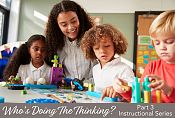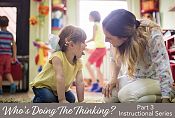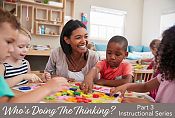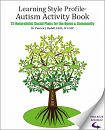How Can Children With Autism Learn Social Skills From Their Peers? Teaching Vs. Mentoring – LSP Part III Instructional Series #e251
Presenter: Patrick Rydell, Ed.D., CCC-SLP
Learn practical strategies to help children with autism learn how to increase their social abilities.
This course is part of the Learning Style Profile© Training Series. The below 2 courses are suggested prerequisites prior to taking this course.
This course takes the empirical research on ASD peer-mediated interventions and provides practical, common-sense strategies for speech-language pathologists to help children with autism learn how to increase their social abilities with friends. Dr. Patrick J. Rydell uses the Learning Style Profile© (LSP) to provide a simple approach that assists children with autism to:
- Establish a primary focus on people vs objects.
- Develop a social priority.
- Look up and around at the social cues and information available and to “read the room”.
- Establish a comfort zone with learning from peers and friends.
- Learn from peers and friends as primary sources of information.
These strategies also help children with autism to see a peer(s) as a trusted mentor and “wingman” as confidence builds to participate in unplanned social activities with friends. Five goals are offered to guide this process.
Offered for 0.1 ASHA CEUs – 1 Contact Hour.Course Overview – Run Time: 1:16:19
- Description of the Learning Style Profile© (LSP) for Children with Autism Spectrum Disorder (Rydell, 2012).
- Peer-mediated (mentor) intervention priorities.
- Peer-mediated (mentor) intervention goals.
- “Rotation of Coaches” intervention strategies.
- “Rotation of Coaches” application to naturalistic settings.
– M.K., prior course participant
Read more comments about this course!
This presentation will focus exclusively on the Learning Style Profile© (LSP). Other treatment approaches will receive limited or no coverage as part of this training. Presenter financial and non-financial disclosures may be found in the Presenter & Disclosures area.
Video PowerPoint presentation with author narration & downloadable handout. Stop and re-start the course at any point. Learners retain access to course content after completion for ongoing reference and review.
Reviews
"Look up and look around; using a "wingman"; varying routines were beneficial to discuss. I appreciated the handouts that I could follow along with during the course." L.C. (Jun. 2024)
"How to incorporate peers more into therapy was a helpful topic. Very specific examples." K.F. (May 2024)
"The most beneficial for daily practice was the topic of how to prepare children with ASD to make friends. The "formula" was great! This course provides strategies that I can readily use in my practice." L.A. (Feb. 2024)
"Excellent outline and presentation! The speaker was amazing!" K.H. (Dec. 2023)
"Clear process for implementation. Pat has a great common sense approach to this topic." S.M. (Dec. 2023)
"Beneficial explanations for the "why" of the approach. Good analogies and walkthroughs of content." L.M. (Dec. 2023)
"I liked the intervention set-up and the explanation and importance of rotating coaches. Presenter spoke clearly and explained ideas well." A.M. (Oct. 2023)
"I liked the treatment ideas - how to use JARs and charades during a session." J.P. (Aug. 2023)
"Understanding that our students with ASD aren't cueing in to their peers at all. The presenter spoke clearly and slowly with a lot of good information." K.A. (Aug. 2023)
"Learned things I can use tomorrow in my therapy sessions. I liked all of it." A.P. (Aug. 2023)
"The suggested goals were beneficial." K.W. (Apr. 2023)
"I liked the topic of using peers and aides and the emphasis on switching roles and having children think for themselves. The slides were clear and instructive." P.H. (Mar. 2023)
"The presenter was able to provide background information, suggested goals, and intervention methods for the Learning Style Profile. I enjoyed this entire presentation by Dr. Rydell." M.H. (Jan. 2023)
"The speaker was engaging. I liked the outline and specific examples of the 3 Rotations." R.H. (Dec. 2022)
"Step-by-step directions. I liked the coach rotation and carryover to peers." M.H. (Dec. 2022)
"Dr. Rydell spoke clearly and explained everything very well. He kept my attention and it was very interesting. I liked the discussion of not always telling the children exactly what to do, but modeling and having them look for social cues." K.S. (Nov. 2022)
"Well presented, organized. I liked the introduction of peers for social growth." A.W. (Nov. 2022)
"I liked the topic of the behavior of children with Autism in social settings." M.G. (Oct. 2022)
"The speaker was clear and easy to listen to. I liked the process to get more peer mentoring." K.L. (June 2022)
"The need to get away from the constant prompting & telling students exactly what to do, when to do it, & how to do it. I see this every day with untrained aides or aides who are just there to "get the daily job done" & "keep things running smoothly". I liked the sequenced presentation." K.L. (Feb. 2022)
"Very practical language and examples were used. The presenter was very down to earth and knowledgeable." M.T. (Dec. 2021)
"I liked the advice to drop the prompting and let the student read the room and figure out what to do even if it takes some time (not to immediately jump in with a prompt). I liked the explanations of how to go through this process as well as the examples of goals." L.S. (Dec. 2021)
"I liked the explanations of how to go through this process as well as the examples of goals." L.S. (Dec. 2021)
"I liked the concept of a wingman and following the wingman for social cues. I also liked the emphasis on trust and confidence as crucial elements to independence. I found the course to be highly applicable content and an excellent framework for how to think about and approach social language intervention." K.S. (Dec. 2021)
"Teaching independence to the child – practical suggestions to use tomorrow." C.M. (Dec. 2021)
"I don't work with this population however my son has ASD and I feel I can apply it to our home life. I loved how the presenter broke down all the steps of how to take the child with ASD from focusing on objects to focusing on the environment and peers. Finding the wingman." (Nov. 2021)
“This course was organized, concise, and full of useful information.” C.F. (Nov. 2021)
"Very practical. Can use immediately in therapy. Enjoyed the speaker." A.H. (Oct. 2021)
"The suggestion to create a people-centered (as opposed to object-centered) classroom and how to do this will be helpful in guiding classroom teachers who are teaching social skills in the classroom." E.M. (Sept. 2021)
"The Joint Action routines could work with my non-verbal autistic population - that was most helpful." J.P. (Sept. 2021)
"I liked the organized, comprehensive description of the roles in the approach." H.W. (Aug. 2021)
"The use of common routines and activities to establish joint attention and develop the uses of peer mentors was good." A.S. (Aug. 2021)
"Very good practical information on the correct way to utilize peers in social skills interventions." J.B. (Aug. 2021)
“How to teach children with autism to learn social skills from peers. It was explained in a very easy and clear way to be understood.” R.O. (Apr. 2021)
"This is one of the most relevant and highly useful courses that I have taken on this subject. Working in a school setting with intensive structured learning environments and ABA therapy being the trend, this course was extremely relevant as to why we need to move away from the prompted and structured discreet trial methods and focus on the social skills that will allow the child to think and process what he/she is taking in from the room. This is an area that I struggle with as ABA is becoming the above all type of treatment and in my opinion, taking away from the very social interaction skills that it believes it is training. Thank you for a relevant and useful course." M.K. (Jan. 2021)
Course Objectives
- Describe the learning style challenges children with autism face when learning from social partners.
- Describe the peer-mediated (mentoring) intervention set-up and implementation of the “Rotation of Coaches” process.
- Identify the benefits of using peer mentors as trusted sources of social information.
Presenter & Disclosures

Patrick J. Rydell, Ed.D., CCC-SLP, is the Founder and Director of the Rocky Mountain Autism Center, Inc. and Autism On Call, LLC, in Lone Tree, Colorado. With more than 38 years of practice (“on the floor”) in the field of Autism Spectrum Disorder (ASD), he has provided international and national trainings, workshops, consultations and program development to governmental agencies, medical facilities, universities, school districts, professionals and families. His doctorate was earned through a National Institute of Health Leadership in Autism grant (1989) and he has a double master’s degree in speech pathology and special education with a program emphasis in early childhood and autism spectrum disorder. Dr. Rydell is a U.S. Fulbright Senior Specialist Grant recipient (2005). Dr. Rydell is the co-author of the SCERTS Model (Prizant, Wetherby, Rubin, Laurent & Rydell, 2006) and author of the Learning Style Profile for Children with Autism Spectrum Disorder (Rydell, 2012) and Autism On Call Educational Series (Vimeo, 2017). Dr. Rydell has also co-authored 5 book chapters and numerous peer-reviewed research articles on topics related to autism spectrum disorders. He is currently developing ASD programs across Asia, Central Asia, and South America based on the LSP approach.
Speaker Disclosures:
Financial — Patrick Rydell is a presenter of online CE courses sponsored by Northern Speech Services; receives royalty payments.
Financial — Patrick Rydell is the author of Learning Style Profile Autism Activity Book; receives royalty payments.
Financial — Patrick Rydell is the author of Learning Style Profile for Children with Autism Spectrum Disorder, published by Rocky Mountain Autism Center (January 21, 2013); receives royalty payments.
Nonfinancial — Patrick Rydell has no relevant nonfinancial relationships to disclosure.
Intended Audience / Accreditation

This program is offered for 0.1 ASHA CEUs (Intermediate Level; Professional Area).

Intended Audience
- Speech-Language Pathologists
ASHA CEUs: NSS online courses are registered with ASHA and are offered for ASHA CEUs. The number of ASHA CEUs is noted above. Note that 0.1 ASHA CEU = 1 contact hour = equals 1 CEE.
ASHA CE Registry: During the enrollment process, if you select to receive ASHA credit for this course and if you provide your ASHA number, NSS will automatically submit your CEU information to the ASHA CE Registry after successful course completion (80% on post test). This submission happens once per month, during the first week of the month. For example, if you complete your course on November 7th, NSS will submit all November online course CEUs to ASHA during the first week of December. When ASHA inputs the information into their database, they will mark the course as completed on the last day of the month in which it was completed, so November 30th using this example. The certificate of completion available for you to print immediately, however, will reflect the actual completion date, November 7th in this example. Due to ASHA processing procedures please allow 2-3 weeks, from the submission date, for the course to appear on your ASHA transcript.
ASHA CEUs: Attendees must meet at least one of the following conditions in order to be eligible to earn ASHA CEUs:
- Current ASHA Member.
- ASHA Certificate of Clinical Competence (CCC) Holder.
- Licensed by a state or provincial regulatory agency to practice speech-language pathology (SLP) or audiology.
- Credentialed by a state regulatory agency to practice SLP or audiology.
- Credentialed by a national regulatory agency to practice SLP or audiology.
- Engaged in a Clinical Fellowship under the supervision of an individual with their ASHA CCC.
- Currently enrolled in a master's or doctoral program in SLP or audiology.
If an attendee is not an ASHA member or CCC holder but meets any of the above criteria, they may inform the ASHA CE Registry of their eligibility by visiting this site.
Licensing Boards: Most state licensing boards DO accept CEUs earned online (usually classified as home-study credits). Some state boards do, however, place a limit to the number of credits that can be earned via home study/online courses. For the most current information, we suggest that you contact your licensing board or agency to verify acceptance policies and/or any credit limits related to home-study courses prior to registering for this course.
Additional accrediting agencies by which Northern Speech is an approved CE provider:
- California: NSS is approved as a provider of continuing education by the California Speech-Language Pathology & Audiology Board. Provider #PDP4. Online CEU limits may apply; please contact SLPAHADB for current online CEU acceptance policies.
- Iowa: NSS is approved as a provider of continuing education by the Iowa Board of Speech Pathology and Audiology Examiners. Provider #169.
- Kansas: NSS is approved as a provider of continuing education by the Kansas Department of Health and Environment. Provider #LTS-S0005.
- Florida: NSS is approved as a provider of continuing education by the Florida Speech-Language Pathology and Audiology Board. Provider #SPA-026.
- New Jersey: NSS is approved as a provider of continuing education by the New Jersey Department of Education. Provider #1654.
Frequently Asked Questions
Customer Support: Please phone 888.337.3866 or email info@northernspeech.com.
Course Completion Timeframe:
You have unlimited time to complete our online courses. You may log off and log on as often as you’d like to in order to complete all sections of a course.
However, completion dates are based on Eastern Standard Time. Therefore, if you need your CEUs by a certain date, be sure to complete the course test before 11:59pm EST on that date. For example, if you need CEUs before January 1st, you will need to complete the course test before 11:59pm EST on December 31st.
Content Access:
Access to course materials and content does not expire, even after completing the post test. You may continue to review course material by logging into your NSS account, clicking the My Online Courses tab, and then viewing your desired course.
Certificate of Completion:
On successful completion of the post test (80%), a certificate will be immediately available for download and/or printing. This certificate will include your name, date of completion (based on Eastern Time Zone, USA/Canada), and number of contact hours (CEUs / CEEs). Please note that CEUs are awarded on the date of successful test completion, not the date of course enrollment. Please ensure that you successfully complete the post test prior to any licensure renewal dates.
ASHA CE Registry Submission:
During the enrollment process, if you select to receive ASHA credit for this course and if you provide your ASHA number, NSS will automatically submit your CEU information to the ASHA CE Registry after successful course completion (80% on post test). This submission happens once per month, during the first week of the month. For example, if you complete your course on November 7th, NSS will submit all November online course CEUs to ASHA during the first week of December. When ASHA inputs the information into their database, they will mark the course as completed on the last day of the month in which it was completed, so November 30th using this example. The certificate of completion available for you to print immediately, however, will reflect the actual completion date, November 7th in this example. Due to ASHA processing procedures please allow 2-3 weeks, from the submission date, for the course to appear on your ASHA transcript.
Purchase Orders:
Purchase orders are currently not accepted for online orders, if you wish to submit a purchase order please do so at info@northernspeech.com or fax to 888-696-9655.
What is an Online Course?
Our Online Courses consist of video, audio, and/or text content and are offered for ASHA CEUs. Unlike a webinar, which requires participants to be logged on and at a computer at specific times, our Online Courses are available to you at any time, from any device, via your NorthernSpeech.com online account. You may work at your own pace and start and stop your course as you wish. Your course will conclude with a short post test. On successful completion of the post test (>80%), a printable certificate of completion is presented to you.
Receiving CEUs:
Northern Speech is an ASHA CE Provider and our online courses are registered with ASHA and offered for ASHA CEUs. Please note that successful completion of the online post test is required prior to the awarding of CEUs. Please contact your state licensing board for acceptance policies related to CEUs earned online. Please note that courses offered for university students are not applicable for CEUs.
Registering for an online course:
You may browse all online courses by clicking the Continuing Education tab above, then Online Courses. Once you find a course, click Enroll Now, and you will be asked to either log into your existing Northern Speech account or create a new online account. Once you’ve entered your account information and provided your credit card payment, your course will be immediately available to you.
Accessing your purchased course or returning to a purchased course:
You will be able to access your online course by logging into your Northern Speech account and then clicking the My Online Courses tab on your profile screen. Click the course you would like to start or to resume. From there, proceed through the course sections until you are ready to complete the post test. You do not have to complete your course all at once. You may log on and off as you wish.
Testing requirements:
Each online course concludes with a post test consisting of multiple choice or true & false questions. Scores of 80% or greater are required for successful course completion and awarding of CEUs. You may revisit course materials and retest as needed to achieve a passing score.
Number of CEUs offered:
We offer courses from 1 to 21 contact hours. Each course will note the number of CEUs offered. Please note that 0.1 CEU = 1 contact hour = 1 CEE.
State licensing boards and online CEUs:
NSS is an ASHA CE Provider and most state licensing boards DO accept ASHA CEUs earned online (usually classified as home-study credits). Some boards do, however, place a limit to the number of CEUs that can be earned via home study/online courses. For the most current information, we suggest that you contact your licensing board or agency to verify acceptance policies and/or any CEU limits related to home-study courses prior to enrolling in an online course.
Course formats:
Our course formats include: text, audio, video, and PowerPoint with author narration. Each course will note the format on the course description page. Most courses include closed captioning.
Course handouts:
Most of our online courses provide a link to download the accompanying handout as a PDF file.
Group discounts:
Groups of 3 or more are eligible for a 20% discount on each registration on most of our online courses. To receive this discount, registrations need to be processed together via the "Group Rates" tab on the Online Course of your choice.
Computer requirements:
For our online courses to function best, we recommend that you update your computer to include the newest version of your Internet browser (Safari, Chrome, Firefox, Edge, Internet Explorer, etc.) and newest version of your computer's operating system. Also a high-speed Internet connection is recommended (cable or DSL). Speakers or headphones will be required for many of our courses as many contain audio components.
Course Cancellation Policy:
A purchased online course can be exchanged, refunded, or transferred to another individual if contact is made with NSS (via phone or email) within 30 days of purchase and the course materials have not been viewed or downloaded.
Special Needs:
Please click here for any special needs requests, and we will do our best to accommodate them.
| Contact Us |









